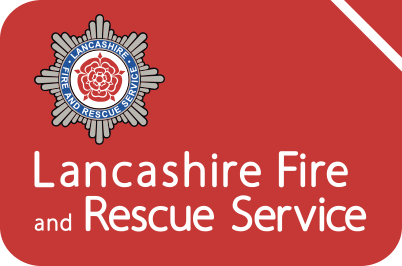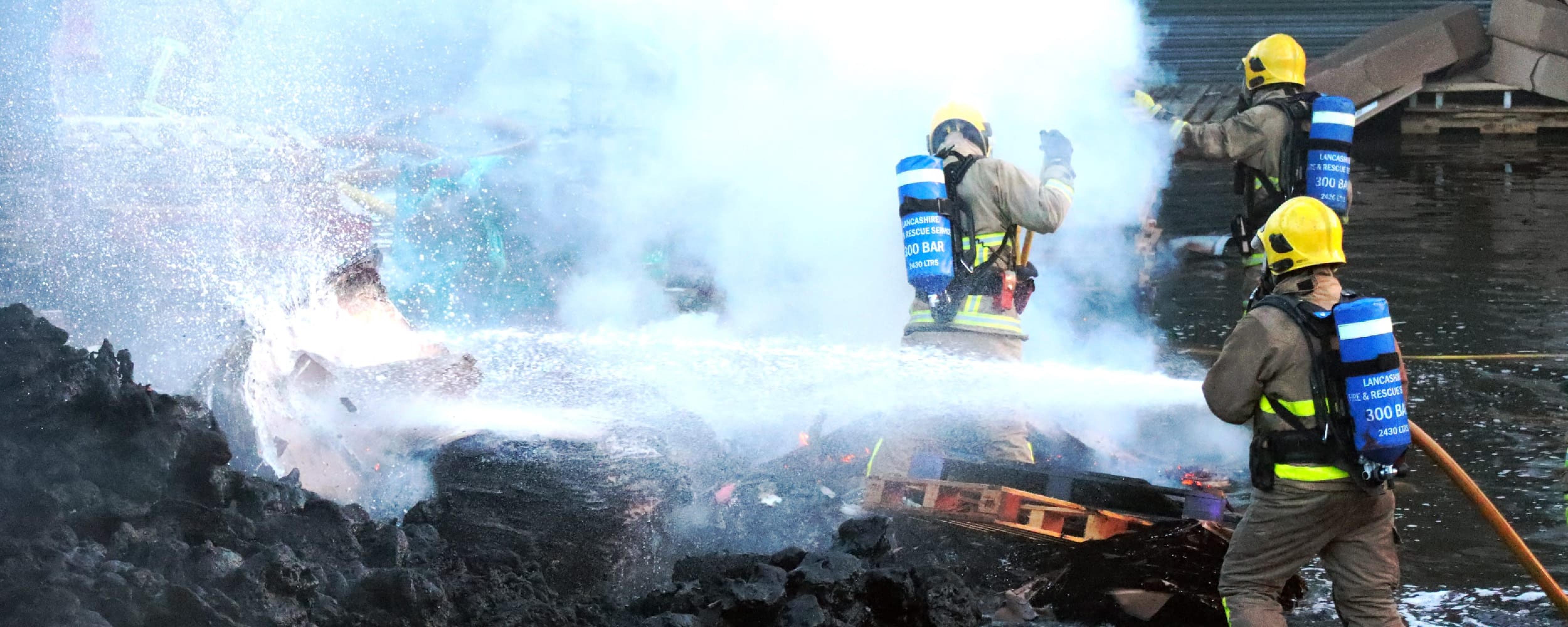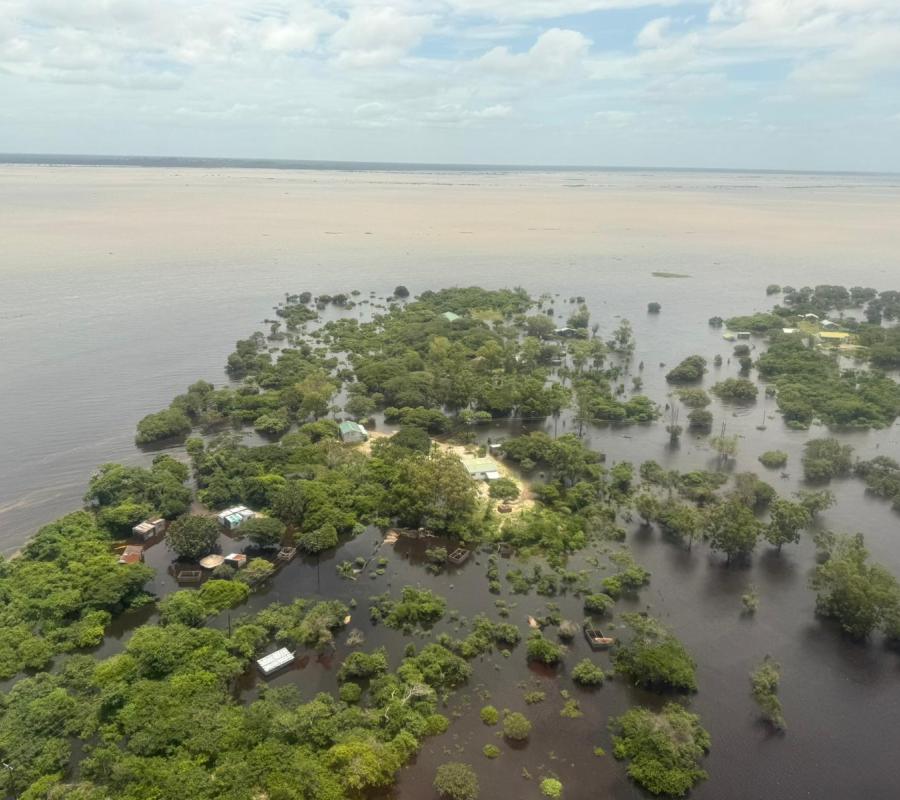Operational guidance
We will maintain, review, and develop robust systems, processes and procedures that build upon national operational guidance, and fire standards supporting the identification and management of operational risk. This will enable us to provide clear guidance for operational responders to ensure a safe, effective, and efficient response to operational incidents.
Leadership & Development Centre (LDC)
Operational learning and training are an essential component used to develop and maintain competent firefighters and officers to respond with the right knowledge and skills to a wide range of incidents, safely and effectively. Our training facility ensures that our firefighters and managers are trained to high standards. This is completed through realistic practical and theoretical training sessions utilising a range of props and technology in simulated training sessions and exercises.
We will continue to deliver and participate in collaborative training in line with the requirement as laid out in the Fire and Rescue National Framework.
Training will be in the form of practical and desktop exercise throughout the period of this response strategy. Key areas of training will be determined by due consideration of the national risk register, local community risks and both national and local operational learning. We will continue to support our firefighter apprentices and focus on our new starters’ growth to ensure they contribute to our operational preparedness and response arrangements, supporting our diverse communities.
Response and Emergency Planning (REP)
REP is fundamental to our response activities; the department write and develop policy and procedures which are derived from national operational guidance. Business continuity planning ensures that a strong response position is maintained for spate condition such as bad weather, pandemics, staff absence, fall back mobilising, major/critical incidents, and incident command support.
Operational assurance and learning
We will continuously review all aspects of the operational performance of our crews, to enable us to monitor compliance with requirements, but more importantly, to identify learning, ensuring we act to immediately rectify any identified shortfalls and continuously improve.
To make sure that we operate as safely and effectively as it can, we will continue to build strong planning, preparedness, response, and learning processes. We will audit our work to evaluate how well we perform. In order for us to do this:
• We will prepare for inspection by His Majesty's Inspectorate of Constabulary and Fire and Rescue Services. This programme has been established under the Government’s Fire Service reform agenda to assess effectiveness, efficiency, and leadership.
• We will review national operational guidance, fire standards, and make amendments (where necessary) to standard operating procedures and
• associated training activity, which will be aligned to new national training specifications.
• We will complete an operational debrief for incidents and complete a command debrief and multi-agency debrief when appropriate to ensure learning and good practice. Incident assurance will be delivered by competent assessors and a proactive operational capability monitoring process.
• We will, where appropriate to do so, share lessons learned nationally through joint organisational learning (JOL) and national operational learning (NOL) protocols, we will also share this information with local partners and where appropriate, with regulatory authorities to prevent any reoccurrence.
Built Environment Team (BET)
The purpose of the team was to offer an informed assessment of how well we managed risk within the built environment, identifying areas of best practice, development growth and opportunities.
The BET focussed on three key thematic areas:
1. Operational training.
2. Operational response.
3. Fire protection.
In determining our preparedness and response to the built environment risk, the team considered three key areas:
1. Our people.
2. Our process.
3. The technology we use.
This framework enabled the BET to draw together information, intelligence, data, best practice, and professional judgement to evidence the current position and how we may develop, grow, and refine over the coming years to ensure it remains fit for the future.
To assess how we prepare, respond, learn, and manage built environment risk, the team looked at the three thematic areas which are the most fundamental aspects of the practical application of managing this risk. Namely, protection-based activities, operational activities (both planning and responding) and training activities across all functions.
To better frame the questions and provide structure to the information gathering the team considered:
• Organisational legislative requirements: for instance, FRS Act 2004, Fire Safety Order 2005, CCA 2004.
• Role specific legal requirements.
• Best practice/guidance, e.g., operational guidance (OG).
• The organisation’s preparedness and understanding of the environment it is operating in i.e., Strategic Assessment of Risk (SAoR), Community Risk Management Plan (CRMP).
• The policies and procedures currently in place which shape its people, process, and technology: for instance, selection and development, project management, strategic ownership and accountability.
• The training and development of its staff across all functions.
• The implementation of procedures and ‘ways of working’ across all functions along with the consistency, robustness, and perceived benefits.
• The mind-set throughout the organisation.
This structure, therefore, ensured a logical methodology flowed; from how we interpret, understand, and apply our legal duties, to assessing and managing risk through local delivery of those legal duties.
It also ensured that any recommendations made, were supportive of organisational improvement to better align us back with its intended mission along with complementing one another to provide a ‘golden thread’ throughout the Service.
In short, the BET looked at how well we prepare and equip our people to do the job at hand and, ultimately how effective our structure, training and governance combined from top down and bottom up is, to remain competent, proficient, and fit for the future.
The work and report have culminated with 14 recommendations drawn together from intelligence, data, and professional judgement. These recommendations will build upon an existing foundation of solid knowledge, understanding and actions whilst shaping thinking, workstreams and decision making, to better improve our response, not just to the built environment risk, but to our operating environment across Lancashire.
Site specific risk information (SSRI)
The gathering of operational risk information is one of our key activities. We have an integrated approach to managing the risk; thereby ensuring safe systems of work for all employees.
We will undertake incident pre planning and the gathering of operational risk information to enable:
• The prevention of injury and ill health of firefighters and other emergency responders.
• Management and mitigation of risks in the community.
• Continual improvement in the provision of accurate, relevant and timely operational information available to responding crews.
• Compliance with the legal duties on fire and rescue authorities in relation to operational risk information
• Compliance with formal guidance and “best practice” models; and
• Audit and review mechanisms
We will review the relationship between our fire protection and response teams to ensure all of our staff are aware of the emerging built environment risk to ensure our preparedness work through SSRI visits, plans and exercises is robust.
Partnership working
We will, in line with our responsibilities as a category one responder under the Civil Contingencies Act, play a full and active part of Lancashire’s Local Resilience Forum (LRF). The LRF’s main responsibilities are to ensure that local risks are assessed and that preparedness, in terms of response and recovery arrangements are in place to deal with the range of potential emergencies that could affect the county.
The LRF aims to help Lancashire be resilient to emergencies by working together to plan, respond and recover from events affecting people, economy, or the environment.
We have fully embedded the principles that underpin the Joint Emergency Services Interoperability Programme (JESIP) and work together via the LRF to ensure a common understanding and shared situational awareness exists across all category 1 and 2 responder agencies.
We will undertake regular exercises with the LRF and partners to test its own plans and also work with other agencies to test the multi-agency plans. Our joint aim within Lancashire is to improve our capability to respond to any disruptive challenges and minimise the effects on our communities.
Collaboration and interoperability
We have a long history of successful partnership working and work closely with our key partners to ensure that we fully understand each other’s capabilities and limitations, command and control procedures and can communicate with one another effectively at incidents.
Through the Blue Light Collaboration Board, we have a programme of identified opportunities that are explored for feasibility and innovative ways of enhancing the emergency service available to our communities, whilst at the same time realising greater efficiencies through working together. We will continue to scope new opportunities, whist delivering against feasible agreed deliverables.
Research and development
We will through our research and development group constantly review our operational resources considering emerging issues, equipment and practices against national and international best practice.
We will consider advances in technology, enhancing our operational capability and ensure firefighter safety is enhanced through the provision of robust procurement, evaluation, monitoring and maintenance of all operational assets and equipment ensuring they perform when required.





